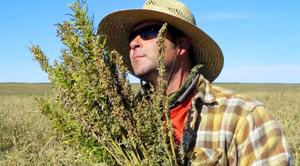Source: technicianonline.com

Industrial hemp has taken a big step forward on the long road back from being named a Schedule 1 drug in the Controlled Substances Act of 1970.
From being considered a narcotic along with the likes of heroin, LSD and ecstasy, the non-psychoactive member of the Cannabis family became legal to grow in North Carolina when Gov. Pat McCrory allowed Senate Bill 313 to go un-vetoed in late October.
Senate Bill 313 authorizes an industrial hemp pilot program, a trial-run for a larger scale program, and establishes the structure and powers of a regulatory commission which will be responsible for overseeing the future pilot program participants. This commission will also be responsible for implementing university research programs.
The North Carolina Industrial Hemp Association, the lobbying group that was the driving force behind this legislation, and other long-time activists are celebrating this as a victory, but now the real work begins: creating an industry from scratch.
According to Warren Williams, director of operations for the NCIHA, the infrastructure and interest from farmers is there to get started, as are the prospects for the future of North Carolina, but there are still obstacles to having seeds in the ground.
In order for any moves to be made toward growing hemp, the NCIHA must raise $200,000 from private funds in order to cover the operations of the regulatory commission that would oversee hemp production. This is because the most recent budget did not allocate enough funds to cover this commission, forcing the writers of the SB 313 to include a section stating that the commission “shall not meet or undertake any of its powers and duties … until it has obtained funding from sources other than State funds of at least two hundred thousand dollars” to support its operations.
“The public funds were not available,” Williams said. “Nothing could happen until the budget was passed because [the legislators] didn’t know if [the state government] would have the $200,000 or not, so in order to form the commission, we needed $200,000. If the public funds were available, great, but in order to get the law passed, we had to place into the law that private funds would be used.”
Once this money is raised, the commission will name five members: the commissioner of agriculture, a chief of police, a sheriff, a professor from a state university (either from NC State or NC A&T) who teaches agricultural science and a full-time farmer with more than 10 years of experience.
“If we got this money today, we are so prepared to help out that we could potentially get seeds in the ground as a secondary crop this year,” Williams said. “There’s still a lot of work to be done, but if we got the money by the end of January we could potentially have the seeds in the ground this year.”
Steve Lommel, associate dean for research, said that NC State is “in a holding pattern” until this money gets raised--this is the challenge now for Williams and the North Carolina Industrial Hemp Association.
The stigmatization of hemp as a psychoactive drug in the same class as “blue dream” and “OG Kush” has kept it out of major industrial production for decades, leaving a product that can be used to produce eco-friendly concrete, fabrics, paper, car parts and treat epilepsy, largely untapped. Williams said that even though the 2014 Farm Bill legalized hemp for research purposes nationally, the communities of people that stand to benefit from producing hemp are still held back by this misconception.
“We’ve reached out to the larger farming community and anyone who would potentially be able to profit business-wise from this,” Williams said. “Unfortunately, even under the 2014 Farm Bill they are still a little bit concerned about the [Controlled Substances Act]. North Carolina has passed the law, and we believe that if everyone is following the law, no one should have any problems. The business community is still concerned on a federal level.”
Andrew Klein, NC State alumnus and founder of the NC State chapter of the Raleigh Hemp Society, said that he feels that North Carolina is on the right track but won’t be satisfied until the program is in action.
“The goal of legalizing hemp in North Carolina was absolutely reached, but I won’t be happy until North Carolina farmers begin to plant the seed and grow hemp,” Klein said.
No comments:
Post a Comment